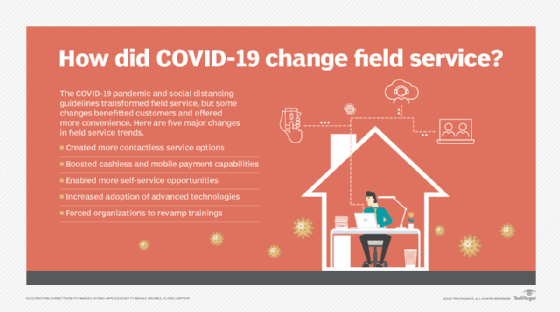The future of field service management and trends
Contactless, cashless and self-service abilities remain standards for field service. The future will bring more flexibility and convenience for workers and customers.
With rumors of a recession and inflation eating into discretionary spending, CX is more important than ever. And field service technicians are often the only representatives customers come face-to-face with from an organization.
Organizations must empower their field service workers to solve problems, meet customers' expectations and retain them. Customer service, as a whole, is a top priority, which makes field service critical to scaling businesses, with significant ROI from technology deployed in 2020 to address health and safety concerns around the COVID-19 pandemic.
As organizations invest in technology to benefit field service agents, the relationship between field service and customers will continue to evolve. These changes will continue to foster new trends in field service management, including more self-service, contactless service and adoption of more advanced technologies. In turn, the future will include more AI, more cloud and more automation.
The current state of field service operations
In 2020, COVID-19 forced organizations to quickly transform how they interacted with customers and managed customer expectations, which led to more online services. AI, automation and smart devices deployed in 2020 are still in use and expected to grow.
These transformations also changed CX, as new technologies and communication channels met safety precautions and new customer demands. Customers have become accustomed to self-service and contactless options, but they still want to interact with field service technicians and customer service reps in specific situations.
With growing market demands, organizations must optimize their field service teams, including contact center staffing across communication channels like phone, chat, online bookings and appointment management. This model enables last-mile delivery management and monitoring, like Amazon delivery confirmations with a photo of the package at its location.
Field service industry trends
As customer expectations evolve and organizations strive to provide customer service as a competitive advantage, field service industry trends also change. The main areas of change for 2024 include an increased adoption of AI, more sustainable operations and new technologies to empower agents and engage employees.
1. Increased adoption of AI
In many organizations, AI has already made significant inroads. Across healthcare and manufacturing industries, organizations heavily invest in IoT and AI. These technologies can also benefit the future of field service management. For example, IoT sensors and augmented reality glasses could help field service workers identify where the customer needs help and provide remote assistance and support.
Other applications for AI include the following:
- AI-informed scheduling that calculates travel time, customer preferences, issue priority and other factors.
- Insights from field service data, so leaders can spot anomalies and outliers like excessive job completion time or a high rework percentage.
- Preventative maintenance schedules based on past service.
- Chatbots and self-service options for customers using generative AI.
2. Increased use of self-service
Self-service portals offer an initial point of contact between a customer and an organization and can capture details about the customer's problem. Those details tell field service teams what to expect and where to resolve the issue.
Self-service also offers field service teams a starting point to find resolutions. If an organization uses a software-enabled device or mobile app that employees can update in real time, field service workers and customers can stay in sync and manage expectations on both sides.
In 2024, organizations can use tools like self-scheduling, knowledge bases and customer portals to let customers troubleshoot their own issues and schedule appointments, freeing up agents for more critical issues.

3. Use of cashless and mobile payments
More customers use cashless payment options than ever before. From apps like Venmo and PayPal to instant transfers, digital payments have increased across the board. Mobile payments offer customers more convenience than cash or physical cards.
Organizations that can't invest in contactless card readers can enable mobile payments in other ways. For example, customers could pay through a secure portal on the company website, smartphone application or separate offering, or through a third-party payment processor with brands like PayPal, Square or Stripe.
4. Broader focus on sustainability
Heading into 2024, the corporate focus on sustainability shows no signs of slowing down. However, field service requires a lot of travel, so organizations should find ways to reduce their carbon footprint regarding fuel consumption and vehicle emissions.
Organizations can decrease CO2 emissions with technologies like the following:
- Apps that aggregate GPS data, route information and job site locations to optimize routes.
- Mobile communications to relay changes to field service technicians in real time, so they do not travel to already completed, canceled or rescheduled appointments.
5. More focus on employee experience
As organizations continue to face a field service talent shortage, they should aim to improve their employee experience.
This can take several routes, including the following:
- Hybrid or flexible work options that improve work-life balance and help employees be productive in ways best suited to their work styles.
- Improved onboarding to introduce new employees to the company and decrease turnover.
- Technology to support dispatch from homes, rather than a central office. This could also reduce time spent in traffic, so workers get to customers faster.
6. Continued investment in cloud-based software
Real-time monitoring can help organizations send the nearest field service technician to customers who need assistance, but it requires instantaneous access to technician and customer information. This support requires continued investment in cloud-based software.
Cloud-based field service management tools will continue to be a critical part of improving CX in 2024. Organizations will continue to integrate with existing ERP, CRM, HR and other systems to provide better knowledge management, including a 360-degree view of the customer to field service employees.
7. More training on soft skills
Employees usually receive training on the technologies and knowledge needed to do their jobs. However, to improve CX, field service workers also need to cultivate soft skills, like empathy and interpersonal communication. To ensure employees develop those skills, organizations should invest in soft skills training in 2024.
8. Continued emphasis on safety and risk management
For the past few years, risk management has come to the forefront, and organizations will continue to focus on it for 2024 and beyond. Field service management will encompass compliance with Occupational Safety and Health Administration regulations and include easier access to safety checklists, emergency procedures and other ways to improve employee safety.
Key takeaways
Organizations that follow current and future field service management trends can strengthen their relationships with customers. The benefits of field service management include increased customer loyalty, customer and employee retention, and increased revenue.
Editor's note: This article was originally written by Sandra Mathis and expanded by Christine Campbell.
Christine Campbell is a freelance writer specializing in business and B2B technology.







